
ENGIE empowers clients globally to decarbonise and address the energy transition


In recent months, energy market participants have faced extreme volatility, soaring energy prices and supply disruptions following Russia’s 2022 invasion of Ukraine. At the same time, they have needed to identify and mitigate the longer-term risks of the energy transition
Identifying exposures and mitigating these new risks have been extremely challenging for market participants, requiring trading partners that truly understand their requirements and how to address them.
This year’s Energy Risk Commodity Rankings shed a light on which firms have done well on that front and are held in high regard by their clients. Respondents to the rankings survey voted for their preferred trading counterparties in a variety of categories spanning the commodities complex.
A firm with a particularly strong performance in the 2024 Commodity Rankings is ENGIE, which was voted Best overall energy dealer. It also topped the rankings for power and gas, achieved first place in research and was voted number one for its over-the-counter (OTC) trading platform, EGMA.
Jérôme Malka, a member of the executive committee of ENGIE Global Energy Management and Sales (GEMS), attributes this success to the firm’s laser focus on clients and its ability to help them address the energy transition. “Client proximity is a constant for ENGIE,” he says. Energy Risk spoke to Malka on how ENGIE is supporting clients’ decarbonisation goals, even in turbulent markets.
What has affected your clients most over the past 18 months?

Jérôme Malka: There has been a clear and continued trend towards decarbonisation across the global energy markets. A number of our clients have been engaged for some time in decarbonisation; others are newer to the process. And different situations in various geographies require specific support and services from ENGIE GEMS.
Interestingly, this trend has continued even amid the war in Ukraine. The consequences of this conflict are still being felt today in the energy sector in terms of security of supply concerns and, to some extent, higher energy prices. So, price risk – not only the absolute price of energy, but also the relative price of energy across different products and regions – has created situations for our clients that require very strong support from ENGIE to manage price exposure.
The resulting regulatory changes, such as the European Union’s 2023 gas price cap system, also introduced new uncertainties. ENGIE must stay extremely close to its clients, to offer insights but also to listen to their needs.
Longer-term, how is decarbonisation changing the markets?
Jérôme Malka: The decarbonisation trend has led to very strong market penetration by renewable energy production. Our clients need to better understand the effects of the resulting intermittency of supply at a more granular level – on an hourly, maybe even less than hourly, basis.
This intermittency disturbs the grid and creates challenges when it comes to delivering power where and when clients need it. So, there is a need for significant flexibility, particularly from batteries, which are a very strong focus for ENGIE GEMS. Our business can respond to these changing needs, whether in terms of supplying energy or securing prices and reducing the carbon impact of this supply.
We operate in 16 countries, and demand for our services and products is now growing in the Asia-Pacific region. There is much diversity there. Some countries, such as Japan, have extremely mature economies and energy sectors, while others, like India, are emerging at a super-fast pace. But we see growing demand for green or low-carbon energy in all of these situations.
How does ENGIE position itself in the market?
Jérôme Malka: ENGIE’s current position is the result of decades of development and investment in our offering and our people. Beyond that, we also put our clients at the very centre of our activities. Our integrated model operates all the way along the value chain. ENGIE GEMS is focused on being the link between upstream assets and downstream consumers. So our clients are essential to the way we create value.
But it’s not enough to say it – we also need to do it, and I think recent trends have accelerated our positioning in this respect. During the most turbulent times of the past two years in these markets, when prices were all over the place, we were always there for our clients, providing prices and liquidity. And this positioning has been positively received, not only by our client community, but also among our teams who feel a very strong sense of purpose as a result. That purpose is at the core of everything we do at ENGIE.
EGMA was voted top OTC trading platform again this year – how does the platform complement your offering?
Jérôme Malka: EGMA is a tool that embodies everything I’ve just discussed: our clients need transparency, and this screen is always on, providing them with access to whatever is happening in the market at any moment in time. It’s a way for us to connect them to the market in real time, not provide ex-post analysis. It also gives them the means to transact in a fast, efficient and economical way.
Also, the trends we’ve already discussed don’t just affect one or two markets – all commodities markets are interconnected. Since EGMA provides such a wide array of products, including energy and environmental products, it gives our clients a more global view of how market dynamics are developing.
What’s next for ENGIE in terms of decarbonisation?
Jérôme Malka: ENGIE is extremely focused on developing thermal solutions that are affordable and decarbonised, as well as more innovative technologies and fuels, such as hydrogen and ammonia.
But we fully recognise we are not going to get there alone. Our clients are key partners in this respect – we are creating and inventing together. There is a certain level of risk-sharing when it comes to allowing new solutions to emerge in an economically sustainable way. This is how we are playing a role in accelerating the energy transition.
Sponsored content
Copyright Infopro Digital Limited. All rights reserved.
As outlined in our terms and conditions, https://www.infopro-digital.com/terms-and-conditions/subscriptions/ (point 2.4), printing is limited to a single copy.
If you would like to purchase additional rights please email info@risk.net
Copyright Infopro Digital Limited. All rights reserved.
You may share this content using our article tools. As outlined in our terms and conditions, https://www.infopro-digital.com/terms-and-conditions/subscriptions/ (clause 2.4), an Authorised User may only make one copy of the materials for their own personal use. You must also comply with the restrictions in clause 2.5.
If you would like to purchase additional rights please email info@risk.net